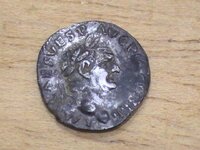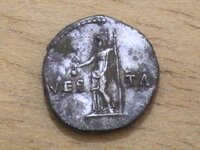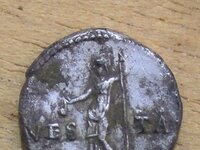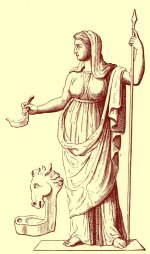Navigation
Install the app
How to install the app on iOS
Follow along with the video below to see how to install our site as a web app on your home screen.
Note: This feature may not be available in some browsers.
More options
You are using an out of date browser. It may not display this or other websites correctly.
You should upgrade or use an alternative browser.
You should upgrade or use an alternative browser.
23-April 2010 / A GREAT DAY !!!!!!!!!!!!!
- Thread starter HISPAN
- Start date
CRUSADER
Gold Member
HISPAN said:The next day I had to visit the findings of aller thought I had dreamed it all... when I met him I thought it was a hammer, look twice but the strange face of the Emperor Vespasian is unmistakable, I have only three Romans Denar and this is the best.
Greetings!
I have got quite a lot of Denarius but not many Vespasian, he's one of the earliest that turn up here. As you say he has a face only a mother could love, very unmistakable
Amazon Forum Fav 👍
Imnengr
Full Member
- Oct 31, 2009
- 204
- 6
- Detector(s) used
- E-trac, X-terra 705, ProPointer
- Primary Interest:
- All Treasure Hunting
Really cool stuff! Thanks for all the pictures, you always put a lot of effort into your posts. 

HISPAN
Gold Member
- Mar 15, 2009
- 5,160
- 605
- Detector(s) used
- WHITES MXT ,GARRET ACE150,GARRET SEA HUNT MARK II.
- Primary Interest:
- Metal Detecting
- Thread starter
- #23
CRUSADER said:HISPAN said:The next day I had to visit the findings of aller thought I had dreamed it all... when I met him I thought it was a hammer, look twice but the strange face of the Emperor Vespasian is unmistakable, I have only three Romans Denar and this is the best.
Greetings!
I have got quite a lot of Denarius but not many Vespasian, he's one of the earliest that turn up here. As you say he has a face only a mother could love, very unmistakable
but with money anything can be done.




boopchapman7456
Jr. Member
You were truly blessed  great finds
great finds  Boo
Boo
 great finds
great finds  Boo
BooSkyPirate
Bronze Member
- Mar 31, 2009
- 1,861
- 83
- Detector(s) used
- Garrett AT Pro, Garrett ProPointer
- Primary Interest:
- All Treasure Hunting
nice!
hikeinmts
Bronze Member
- Dec 13, 2008
- 1,268
- 30
- Detector(s) used
- Cobra II/Minelab Sovereign
- Primary Interest:
- All Treasure Hunting
HISPAN, Got a deal you/I can't beat. You come here on vacation, and we will trapse around S. Korea and dig a few old Korean/Chinese/Japanese coins. Then, back to Spain, and into some of those plowed fields, and find a few of those nice coins
you are finding. Seriously, wish I/we could do it. But, I have a school here, and like a dairy, it is a daily business.
Seriously, wish I/we could do it. But, I have a school here, and like a dairy, it is a daily business.
You would have to keep me, if I closed the school to go hunting in Spain.
Once again, great finds. Would love to pop an early silver coin here, but they are a no-go. Korea didn't do silver until the late, late 1800's, and China and Japan the mid 1800's. Nothing gold or silver before that, as far as I know.
Love your posts. Happy Hunting.
you are finding.
 Seriously, wish I/we could do it. But, I have a school here, and like a dairy, it is a daily business.
Seriously, wish I/we could do it. But, I have a school here, and like a dairy, it is a daily business.You would have to keep me, if I closed the school to go hunting in Spain.

Once again, great finds. Would love to pop an early silver coin here, but they are a no-go. Korea didn't do silver until the late, late 1800's, and China and Japan the mid 1800's. Nothing gold or silver before that, as far as I know.
Love your posts. Happy Hunting.

diggerfororo
Hero Member
super finds. You have some really good sites to hunt. Keep on that site When will you start water hunting
Les

Les
HISPAN
Gold Member
- Mar 15, 2009
- 5,160
- 605
- Detector(s) used
- WHITES MXT ,GARRET ACE150,GARRET SEA HUNT MARK II.
- Primary Interest:
- Metal Detecting
- Thread starter
- #30
diggerfororo said:super finds. You have some really good sites to hunt. Keep on that site When will you start water hunting
Les
I have damaged the aquatic sub detector, I entered the water in the battery tube and a short ..... but the repair and will soon start.

dragonsbreath
Full Member
Thats a great Denarius Hispan...very well done you have good sites to detect on.
Good luck and Happy Hunting for the future ......PaulB. 8)
Good luck and Happy Hunting for the future ......PaulB. 8)
- Jan 6, 2006
- 20,845
- 2,532
- 🏆 Honorable Mentions:
- 1
- Detector(s) used
- Garrett AT Pro, Ace 250 & Ace 400
- Primary Interest:
- All Treasure Hunting
Awesome finds...you did have a GREAT day. 
 RR
RR

 RR
RRdiggerfororo
Hero Member
HISPAN said:diggerfororo said:super finds. You have some really good sites to hunt. Keep on that site When will you start water hunting
Les
I have damaged the aquatic sub detector, I entered the water in the battery tube and a short ..... but the repair and will soon start.
I hope you get it repaired soon so you can post some nice gold finds from your area. I really enjoy your posts so keep posting.
Les
Aussie Okie
Sr. Member
- Oct 2, 2006
- 369
- 162
- Detector(s) used
- Minelab CTX 3030
Minelab Equinox 800
- Primary Interest:
- All Treasure Hunting
Great finds!
RonO
Full Member
What some absolutely great finds. I hope to see many more post from you, Hispan.
Happy Hunting,
Ron in Georgia
Happy Hunting,
Ron in Georgia
Deno
Bronze Member
Now that is history. I would never sleep if i lived there. I would detect myself to death.
Congratulations.
Congratulations.
HISPAN
Gold Member
- Mar 15, 2009
- 5,160
- 605
- Detector(s) used
- WHITES MXT ,GARRET ACE150,GARRET SEA HUNT MARK II.
- Primary Interest:
- Metal Detecting
- Thread starter
- #37
Today about a year ago I discovered Treasurenet! 
Thank you very much everyone for giving me courage to go hunting!
117 posts have been over a thousand photographed findings of the cultures that developed in my area.
Greetings!

Thank you very much everyone for giving me courage to go hunting!

117 posts have been over a thousand photographed findings of the cultures that developed in my area.
Greetings!

Shootem up Tex
Greenie
I wish we had those in Texas
HISPAN
Gold Member
- Mar 15, 2009
- 5,160
- 605
- Detector(s) used
- WHITES MXT ,GARRET ACE150,GARRET SEA HUNT MARK II.
- Primary Interest:
- Metal Detecting
- Thread starter
- #40
Here I show you a brief explanation of the Back of Roman silver coin, which explains the history of the goddess :
Sister of Demeteer [Ceres], and daughter of Cronus and Rhea, was worshipped both by Greeks and Romans as the goddess of 92 the home-fire, or hearth, the name of which was identical with her own. She was properly, therefore, the guardian of family life; her altars were everywhere, the hearth of every house being her sanctuary, and when the family gathered round it daily it was with feelings of regard for that goddess. Every meal prepared on the fire at home revived a grateful sense of the common enjoyments of family life. In every building of pubic resort she had a sanctuary in the shape of a fire; and when in Greece a body of colonists were about to emigrate to new and distant homes, one of their chief considerations was to take with them some portion of fire sacred to Hestia, in order to carry with them the favor of the goddess; for the Greeks looked upon the state as a great family, with an altar of Hestia as its central point: and thus, by taking with them to their new homes a portion of the fire from that altar, or state hearth, the colony retained its interest and participation in the public affairs f their parent state. No enterprise was commenced without sacrifice and prayer at her altar; and when the fire of one of those holy places chanced to be extinguished, it could only be rekindled by a light from some other sanctuary, not by ordinary and impure fire.
As the goddess of a pure element, fire, Hestia despised love, and, though pressed to consent both by Poseidon [Neptune] and Apollo, obtained from Zeus the privilege she prayed for, of remaining in a single state. Her spotless purity fitted her peculiarly to be the guardian of virgin modesty.
Though zealously worshipped throughout Greece, there was no temple specially devoted to her. Her proper sanctuary was, as we have said, by the fire of every house where people gathered together. She had a share in all the sacrifices offered at the temples of other gods, and at every burnt-offering her presence was recognized as goddess of the sacred hearth and altar flame, as it was also in the libations of water, wine, and 93 oil, and in the prayers addressed to her. At the same time she had her own peculiar sacrifices, consisting of young shoots of grain, the first-fruits of the harvest, and young cows. Her priestesses had to remain virgins.
In Rome, however, there was a temple to Vesta that had been built by Numa Pompilius. It was of a round shape, and contained in its centre her symbol of an altar, with a fire that was never allowed to go out. This temple, which stood open by day but was closed by night, contained, besides, other very old figures of deities, the Palladium, a small wooden image of Minerva (Pallas Athene), which, according to the myth, originally fell from heaven upon the citadel of Troy, and was carried thence to Greece, and afterwards to Rome. Upon the preservation of this figure depended, the people believed, the safety and existence of the Roman empire. Her priestess, six in number, were called vestal virgins, their duty being to feed the sacred flame of her temple, and to present sacrifices and prayers for the welfare of the state. To this office they were chosen by the high-priest, who was styled Pontifex Maximus. They wore robes of white, with a fillet round the hair, and a veil, additional ornaments being permitted in later times. It was necessary that the girls selected for this service should be between six and ten years of age, and that 94 they should take a vow of chastity, and serve in the temple for thirty years. After that period they were permitted to leave it, and even to marry, though neither proceeding was viewed with pleasure by the public, who feared the goddess to whom they had been devoted might take offence in either case. While engaged in the service of the temple the vestal virgins enjoyed great esteem and important privileges. Their person was inviolable, they were free from paternal control, and had the right of disposing of their own property. In their festal processions through the streets of Rome they were preceded by lictors, (or officers of justice), who carried with them the fasces, that is, a number of twigs tied together into a bundle, out of which an axe projected as a symbol of sovereign power, — besides them, only the consuls or highest magistrates of Rome were entitled to. And in the course of he procession, should they meet a criminal on his way to expiate his crime by death, they had the prerogative of ordering him to be set free.
With all this respect and esteem, they were very severely dealt with when guilty of neglect of duty, such as permitting the sacred flame of the altar of Vesta to die out, which could only be rekindled by means of a burning glass held 95 up to the rays of the sun. A priestess guilty of this was condemned by the high-priest of the goddess to a dark chamber, and there flogged. For the crime of forfeiting her chastity she was conveyed to a place called the Campus Sceleratus, or criminals field, and there placed in a subterranean chamber provided with a bed, a lighted lamp, and some bread and water. The chamber was then closed upon her, the earth thrown over it and made smooth, and the unfortunate priestess left to die a most agonizing death. Her seducer was publicly scourged to death. The whole city was sorrowful, and sacrifice and long, earnest prayers were offered up to appease the injured goddess. The procession in which the condemned priestess was carried to her crypt — tied down on a litter and so closely covered up that even her screams could not be heard — was a spectacle that raised a shudder, and caused that day to be remembered as one of the greatest pain and grief throughout the city.
At first there were only two vestal virgins, this number being afterwards increased to four, and again by King Servius to six. They were chosen always from the noblest families of Rome. If the legend concerning the foundation of the city of Rome be true, even Romulus and Remus, the founders of that city, were sons of Mars and a vestal priestess named Rhea Sylvia.
The sacred fire on the hearth of the goddess, and the laurel that shaded it were renewed on the 1st of March of each year; on the 15th of June her temple was cleansed and repaired. But previous to this, on the 9th of June, a festival was held in her honor, called the Vestalia, only women being admitted to the temple, and these barefooted and in the character of pilgrims.
Sister of Demeteer [Ceres], and daughter of Cronus and Rhea, was worshipped both by Greeks and Romans as the goddess of 92 the home-fire, or hearth, the name of which was identical with her own. She was properly, therefore, the guardian of family life; her altars were everywhere, the hearth of every house being her sanctuary, and when the family gathered round it daily it was with feelings of regard for that goddess. Every meal prepared on the fire at home revived a grateful sense of the common enjoyments of family life. In every building of pubic resort she had a sanctuary in the shape of a fire; and when in Greece a body of colonists were about to emigrate to new and distant homes, one of their chief considerations was to take with them some portion of fire sacred to Hestia, in order to carry with them the favor of the goddess; for the Greeks looked upon the state as a great family, with an altar of Hestia as its central point: and thus, by taking with them to their new homes a portion of the fire from that altar, or state hearth, the colony retained its interest and participation in the public affairs f their parent state. No enterprise was commenced without sacrifice and prayer at her altar; and when the fire of one of those holy places chanced to be extinguished, it could only be rekindled by a light from some other sanctuary, not by ordinary and impure fire.
As the goddess of a pure element, fire, Hestia despised love, and, though pressed to consent both by Poseidon [Neptune] and Apollo, obtained from Zeus the privilege she prayed for, of remaining in a single state. Her spotless purity fitted her peculiarly to be the guardian of virgin modesty.
Though zealously worshipped throughout Greece, there was no temple specially devoted to her. Her proper sanctuary was, as we have said, by the fire of every house where people gathered together. She had a share in all the sacrifices offered at the temples of other gods, and at every burnt-offering her presence was recognized as goddess of the sacred hearth and altar flame, as it was also in the libations of water, wine, and 93 oil, and in the prayers addressed to her. At the same time she had her own peculiar sacrifices, consisting of young shoots of grain, the first-fruits of the harvest, and young cows. Her priestesses had to remain virgins.
In Rome, however, there was a temple to Vesta that had been built by Numa Pompilius. It was of a round shape, and contained in its centre her symbol of an altar, with a fire that was never allowed to go out. This temple, which stood open by day but was closed by night, contained, besides, other very old figures of deities, the Palladium, a small wooden image of Minerva (Pallas Athene), which, according to the myth, originally fell from heaven upon the citadel of Troy, and was carried thence to Greece, and afterwards to Rome. Upon the preservation of this figure depended, the people believed, the safety and existence of the Roman empire. Her priestess, six in number, were called vestal virgins, their duty being to feed the sacred flame of her temple, and to present sacrifices and prayers for the welfare of the state. To this office they were chosen by the high-priest, who was styled Pontifex Maximus. They wore robes of white, with a fillet round the hair, and a veil, additional ornaments being permitted in later times. It was necessary that the girls selected for this service should be between six and ten years of age, and that 94 they should take a vow of chastity, and serve in the temple for thirty years. After that period they were permitted to leave it, and even to marry, though neither proceeding was viewed with pleasure by the public, who feared the goddess to whom they had been devoted might take offence in either case. While engaged in the service of the temple the vestal virgins enjoyed great esteem and important privileges. Their person was inviolable, they were free from paternal control, and had the right of disposing of their own property. In their festal processions through the streets of Rome they were preceded by lictors, (or officers of justice), who carried with them the fasces, that is, a number of twigs tied together into a bundle, out of which an axe projected as a symbol of sovereign power, — besides them, only the consuls or highest magistrates of Rome were entitled to. And in the course of he procession, should they meet a criminal on his way to expiate his crime by death, they had the prerogative of ordering him to be set free.
With all this respect and esteem, they were very severely dealt with when guilty of neglect of duty, such as permitting the sacred flame of the altar of Vesta to die out, which could only be rekindled by means of a burning glass held 95 up to the rays of the sun. A priestess guilty of this was condemned by the high-priest of the goddess to a dark chamber, and there flogged. For the crime of forfeiting her chastity she was conveyed to a place called the Campus Sceleratus, or criminals field, and there placed in a subterranean chamber provided with a bed, a lighted lamp, and some bread and water. The chamber was then closed upon her, the earth thrown over it and made smooth, and the unfortunate priestess left to die a most agonizing death. Her seducer was publicly scourged to death. The whole city was sorrowful, and sacrifice and long, earnest prayers were offered up to appease the injured goddess. The procession in which the condemned priestess was carried to her crypt — tied down on a litter and so closely covered up that even her screams could not be heard — was a spectacle that raised a shudder, and caused that day to be remembered as one of the greatest pain and grief throughout the city.
At first there were only two vestal virgins, this number being afterwards increased to four, and again by King Servius to six. They were chosen always from the noblest families of Rome. If the legend concerning the foundation of the city of Rome be true, even Romulus and Remus, the founders of that city, were sons of Mars and a vestal priestess named Rhea Sylvia.
The sacred fire on the hearth of the goddess, and the laurel that shaded it were renewed on the 1st of March of each year; on the 15th of June her temple was cleansed and repaired. But previous to this, on the 9th of June, a festival was held in her honor, called the Vestalia, only women being admitted to the temple, and these barefooted and in the character of pilgrims.
Attachments
Top Member Reactions
-
 3556
3556 -
 1972
1972 -
 1820
1820 -
 1201
1201 -
 1136
1136 -
 1011
1011 -
 883
883 -
 855
855 -
 817
817 -
 795
795 -
 742
742 -
 666
666 -
 577
577 -
 566
566 -
 502
502 -
 467
467 -
 422
422 -
E
416
-
 405
405 -
 399
399
Users who are viewing this thread
Total: 3 (members: 0, guests: 3)











